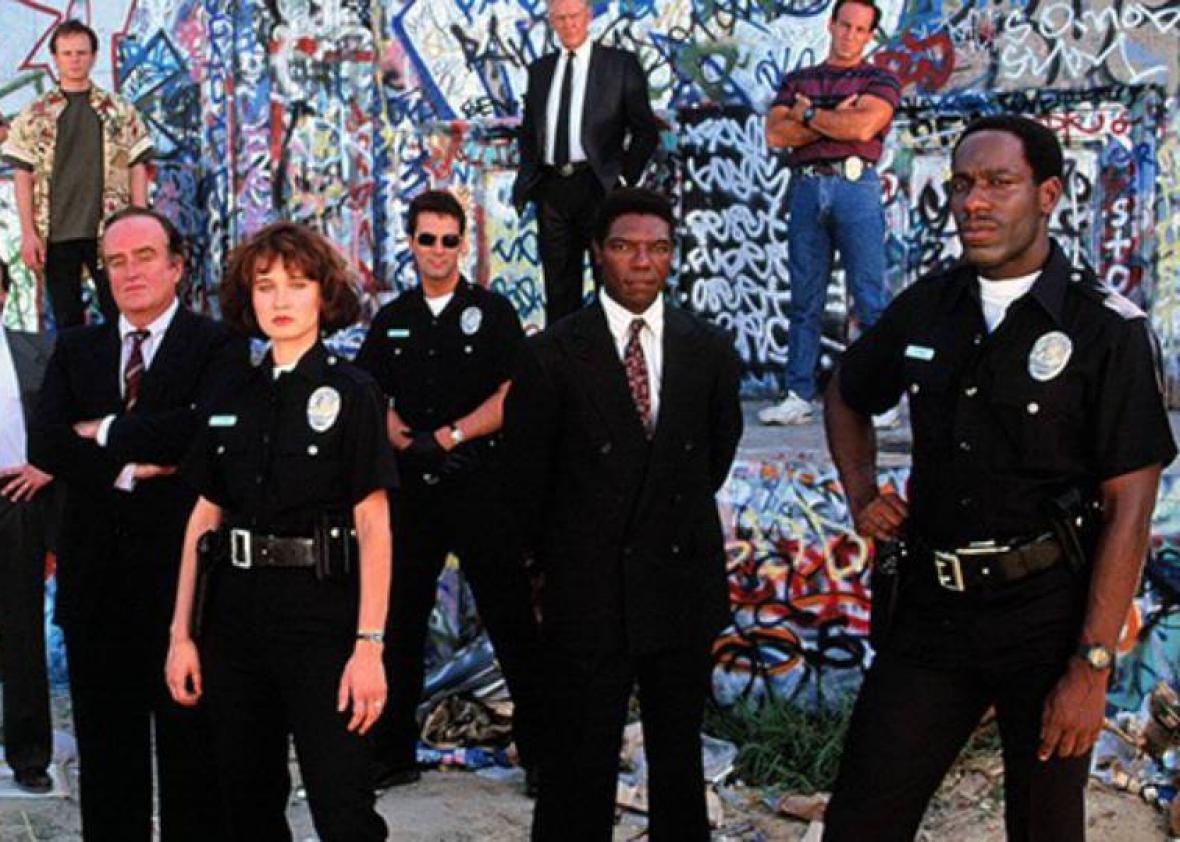In the Museum of Bad Ideas, there’s an entire wing devoted to Cop Rock, the ill-fated musical policier that ran for 11 brief, unloved episodes on ABC in 1990. Now, in an interview on the just-released DVD that collects them all, creator Steven Bochco recalls that both Randy Newman, who wrote the songs for the show’s pilot, and Mike Post, who headed the stable of songwriters for the remaining episodes, told him it was the worst idea they’d ever heard. But Bochco, then riding high on the success of Hill Street Blues and L.A. Law, pressed on, and created an abject failure whose legend has outlasted some of its contemporary successes.
Bocho argues that Cop Rock was doomed before the first episode aired: People found the show’s basic premise so absurd that they never bothered to check out its execution. And it’s true that Cop Rock was easy to ridicule. The week of its premiere, in September of 1990, David Letterman took aim at the show four separate times, and continued to mock it throughout the fall, right up to its inevitable cancellation.
But 1990 was also the year that audiences fell in love, however briefly, with Twin Peaks, so it’s not as if they were opposed to televised weirdness across the board. The New York Times’ Neil Genzlinger made a game attempt at suggesting Cop Rock was “ahead of its time,” but its failures, both commercial and artistic, are very much of its era.
Although it was an expensive show by contemporary standards—so much so that ABC pulled the plug on its 13-episode order two episodes in advance—Cop Rock looks fairly cheap to modern eyes. It’s hard to imagine any circumstances under which the pilot’s opening number, in which the denizens of a drug house accost the police officers arresting them, might actually work; the watered-down network TV version of rap is cringingly awful. But in a more stylized world, the transition from hard-boiled to hip-hop might not be quite so jarring. It was the series’ first opportunity to show viewers how the songs would be part of its world, and it was a mess.
It gets better, thankfully. The first episode’s highlight is a full-blown gospel number in which a judge played by Carl Anderson, best known as Jesus Christ Superstar’s Judas Iscariot, delivers a guilty verdict. (Guilt always was one of Randy Newman’s most fertile subjects.) It’s also the the moment the pilot most pointedly departs from strict realism. The court reporter’s desk flips open to reveal a neon-lit piano keyboard; the jury’s outfits are replaced with choir robes.
The fact that “He’s Guilty” features only one of Cop Rock’s regular cast members, and in a nonsinging capacity, points the way toward the show’s long-term problems. It’s not easy finding triple threats who can sing, dance, and act, let alone a whole cast of them. It’s a treat seeing ‘90s TV fixtures like ER’s Paul McCrane and Chicago Hope’s Vondie Curtis-Hall, but veterans like Barbara Bosson and Ronny Cox come up short in the song-and-dance department, and Broadway ringer Anne Bobby struggles with the dramatic heavy lifting.
More fatally, Cop Rock is crazily uncertain of what kind of show it wants to be: One minute, it’s a gritty drama about a rogue cop (Peter Onorati) on trial for gunning down a cop-killer in cold blood; the next it’s a broad satire in which Bosson’s ambitious D.A. takes campaign advice from identical-twin media consultants. Bochco was determined to address real-world issues, but there are more deft ways to address racial profiling than having a group of Latino suspects sing about being “the local color with the Coppertone skin.” As for the upbeat “Baby Merchant,” in which a sleazy operator tries to sell two undercover cops a freshly kidnapped infant, that has to be seen to be believed.
It’s easy to pinpoint where Cop Rock went wrong. Its songs, neither pre-established hits, à la Glee, or savvy pastiches in a Crazy Ex-Girlfriend mode, are rarely memorable, except for the wrong reasons, and they tend to stall the plot rather than advance it. But it’s worthing noting that even Cop Rock’s dismal ratings would be almost respectable now. Its bizarre finale, in which the actors break character for a final number about the heartbreak of cancellation, is like a wake for a distant relative you never really liked, although it’s worth it for the sidelong glances the cast’s better singers shoot at Cox when his voice breaks on the high notes. Farewell, Cop Rock. We hardly knew ye.
Three years later, Bocho debuted NYPD Blue, his last great show and a crucial forerunner of the TV renaissance, with Cop Rock veteran James McDaniel in a key role as Lt. Arthur Fancy. Blue pushed boundaries, too, so much that its debut was delayed by a year while Bochco did battle with ABC’s censors, and it dealt forthrightly with many of the issues Cop Rock tried to sugarcoat in song. But Cop Rock will always have a place in the annals of TV, if only because truly terribly ideas are nearly as rare as truly great ones.
